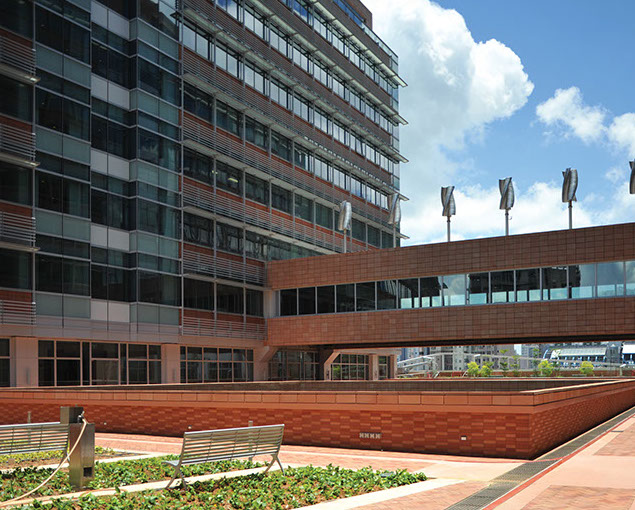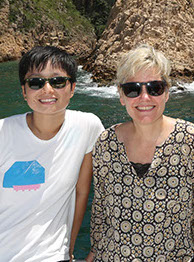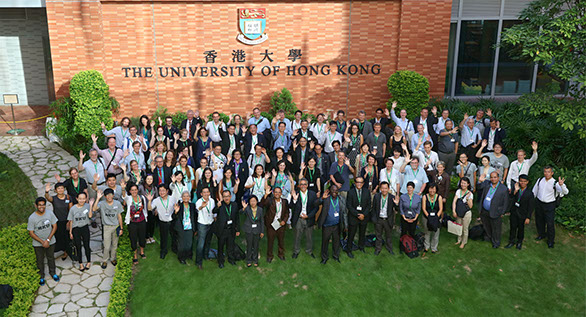
GREEN CAMPUS
PROGRESSIONS
HKU recently hosted a major international conference on sustainability in higher education,
boosting the University’s prof ile and also that of sustainability on campus.

![]() We want to mainstream sustainability
We want to mainstream sustainability
and make it part and parcel of what people do every day, whether it’s to recycle and waste less, reduce our carbon footprint, conserve water, or recognise broader
social issues such as gender equity and cultural diversity. ![]()
Ms Ann Kildahl

Ms Joy Lam (left) and
Ms Ann Kildahl (right) from
HKU’s Sustainability Office.
When Ann Kildahl was appointed as HKU’s Sustainability Manager, in 2008, it was a time of unprecedented growth and change that included construction of the Centennial Campus and the introduction of a new curriculum. Sustainability issues were not front and centre for the University. “Sustainability and climate change are among the most important issues facing the planet, but we are often competing for people’s attention,” Ms Kildahl said.
Now that the dust has settled and campus life has fallen into a new normal, it is time for Ms Kildahl’s office to press their advantage.
In June, they hosted the annual conference of the International Sustainable Campus Network (ISCN), which attracted delegates from 22 countries, including leading Asian, European and North American higher education institutions, the University’s senior management, senior business executives, and Hong Kong’s Secretary for the Environment, Mr Wong Kam-sing. The Mayor of Seoul, Mr Park Won-soon, sent a pre-recorded video message.
The turnout was recognition the University can be a player in promoting sustainability in higher education locally and in the region.
“Hosting the conference helped us to raise awareness of the issues within HKU and
Hong Kong and to raise the profile of our sustainability work,” Ms Kildahl said.
That work has included collaborating with colleagues across the University to expand informal education on campus, building networks, and taking action to improve HKU’s environmental performance.

Participants and student volunteers on the first day of ISCN (International Sustainable Campus Network) 2015 Conference at HKU Centennial Courtyard.
Taking action
Green Connections, a speaker and film series now in its sixth year, encourages networking among students, staff and the wider community. A waste recycling programme, introduced in 2009, has been steadily expanded. The Hong Kong Sustainable Campus Consortium, initiated by HKU in 2010, brings together the city’s eight public universities. As a signatory to the consortium’s Hong Kong Declaration and the ISCN-GULF Charter, HKU has made important public commitments to sustainability.
Other actions include a pilot programme to retrofit buildings with more energy-efficient lighting, air-conditioning systems, and other environmental features such as green roofs. The first retrofit was carried out at Chow Yei Ching Building under an energy performance contract and was awarded LEED (Leadership in Energy and Environmental Design) Gold certification. Work is now underway on TT Tsui Building.
“We have learned a great deal so far,” Ms Kildahl said. “Working with the Estates Office and the University’s facilities managers, there may be features we can scale up across campus.”
With those pieces in place, things are now ready to move to the next level. The Executive Vice-President, Dr Steve Cannon, is chairing a new, high-level working group on sustainability strategy.
Assisted by a consultant, the working group will enable the University to meet its existing commitments, set campus-wide targets, and explore creative, new approaches to sustainability. One goal back on the table is a car-free campus, an idea mooted some years ago that could now be attainable with the opening of the Mass Transit Railway (MTR) station.
Two new hires will be recruited soon to join Ms Kildahl and Ms Joy Lam, bringing the team to four and enabling the Sustainability Office to engage more actively with stakeholders.
Ms Kildahl hopes to see sustainability move closer to the forefront. “We want to mainstream sustainability and make it part and parcel of what people do every day, whether it’s to recycle and waste less, reduce our carbon footprint, conserve water, or recognise broader social issues such as gender equity and cultural diversity. All of these are part of sustainability,” she said.

Executive Vice-President Dr Steve Cannon giving closing remarks at the ISCN Conference.

The problem of water
One of the small but appealing initiatives introduced by the Sustainability Office is the WaterHunt@HKU map, which not only shows where on campus people can fill up their reusable water bottles with clean, filtered water, but also flags a problem that has otherwise been little discussed in Hong Kong.
“Reducing the use of bottled water is a pressing environmental issue due to the harmful effects of plastic production and disposal. More broadly, it’s also a reminder that access to fresh water is so important. In Hong Kong, water is inexpensive and people generally do not conserve it. There are many constraints affecting water supplies in China, however, and with some 80 per cent of our water coming from Guangdong, we need to pay much more attention to it,” Ms Kildahl said.
“Expanding on the efforts of our Estates Office team, we will be working towards a new strategy for water conservation that includes things like increasing the use of low-flow fixtures, reusing and recycling water, changing the way we do landscape – there are all kinds of things we can do. It’s only a matter of time before we will be forced to make changes because water is such a problematic issue for China.”

